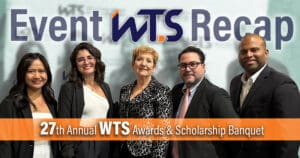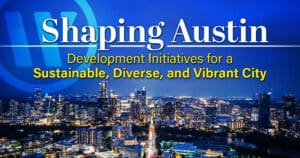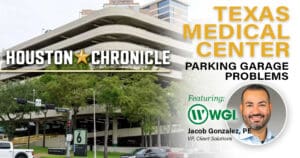
WGI Unleashed Episode 89: Lyndsey Duty, Environmental Scientist
On the latest episode of the WGI Unleashed podcast, we sit down with Lyndsey Duty, one of WGI’s Environmental Scientists based out of our Tampa, FL office!
Learn from award-winning professionals — explore our whitepapers, blogs, and the latest industry updates.
Join our dynamic organization of engineers, land surveyors, landscape architects, environmental scientists, and architects!
Talk to a market leader today! We’ll answer any questions you have about our professional services.

Kicking off the new year in style, WGI once again engaged with passionate professionals from around the transportation industry by attending the two highly-anticipated events: Transportation Camp and the annual Transportation Research Board’s Annual Meeting.
A series of dynamic, collaborative, and constructive events, this year’s gatherings showcased a heightened focus on the ongoing transformation of transportation systems, safety considerations, and funding programs.
Transportation Camp, an unconventional “unconference” held the Saturday preceding the larger Transportation Research Board’s conference, takes a unique approach to collaboration.
Unlike traditional conferences, Transportation Camp does not unveil a full program in advance of the event but rather invites attendees to think through, propose, and vote on breakout sessions, thus fostering dynamic and participant-driven discussions around the topics that matter most to those in attendance.
WGI was thrilled to once again sponsor this year’s “unconference,” taking advantage of the opportunity to collaborate and network with attendees from across the nation via a sponsored table and the sessions/discussions that so many look forward to each and every year.
Noteworthy moments of this year’s Transportation Camp included Veronica Davis, Director of Transportation and Drainage Operations for Houston, delivering an unconventional keynote presentation which involved audience conversation and excerpts from her new book, “Inclusive Transportation.”
Davis also used the opportunity to share insights on equitable engagement techniques, focusing on the needs of “silently suffering” travelers, a group often overlooked in traditional outreach.
WGI’s transportation experts were also thrilled to host a session on complete streets at this year’s conference, with discussions covering critical topics such as bike and pedestrian safety, accessibility, enforcement, and data.
Having previously initiated updates to the American Planning Association’s Complete Street resources, WGI used the session as an opportunity to receive feedback on both our approach and content. The key emphasis points for planners included investing resources in planning for the plan, collaboration with federal and state agencies, consideration of early-stage project funding, and awareness of the U.S. Department of Transportation’s proven countermeasures.
Transportation Camp’s informal format, conducive to tackling difficult conversations and exploring niche topics, remains a major draw. And after a day full with networking, insightful sessions, and dynamic conversations, the themes that captivated the conference and our industry as we enter a new year became clear:
Safety emerged as a prevalent theme due to the Bipartisan Infrastructure Law’s emphasis on increased funding. The discussions emphasized the importance of making projects stand out in the competitive environment of implementation funds.
Accessibility was underscored by the release of the Public Right of Way Accessibility Guidelines (PROWAG), raising questions about the enforcement of the new guidelines.
Enforcement, particularly in the context of pedestrian and bike safety, highlighted the impact of reduced enforcement during COVID, leading to a focus on “self-enforcing streets” through Complete Streets installations.
Data emerged as a vital aspect, with government agencies providing open data sets on transportation systems. However, attendees noted the lack of critical bicycle and pedestrian data for Complete Streets, highlighting equity issues related to data access. While the use of data is established in transportation planning, discussions emphasized the evolving nature of data collection and distribution.
As we look forward to the next year, the anticipation is for more discussions on transportation innovation and, of course, the evolution of Complete Streets.
Did you attend Transportation Camp DC? Well, whether you did or didn’t, our team wants to hear from you!
Reach out to our experts, and let’s keep the discussion going on ways we can improve transportation in our communities together.

WGI is a national design and professional services firm leading in technology-based solutions for the construction of public infrastructure and real estate development. At WGI, we’re providing Tomorrow’s Infrastructure Solutions Today.

On the latest episode of the WGI Unleashed podcast, we sit down with Lyndsey Duty, one of WGI’s Environmental Scientists based out of our Tampa, FL office!

WGI’s San Antonio team laced up their running shoes and braved the rain to take on the iconic Rock and Roll 5K – Discover how they turned challenges into triumphs in this memorable event recap!

With a legacy of supporting, empowering, & inspiring women in transportation, the WTS Central Florida’s Annual Awards & Scholarship Banquet was nothing short of a night to remember.

Discover how Austin is transforming urban development with proposed zoning changes, inclusive housing initiatives, and creative space preservation—all while embracing growth and sustainability.

Texas Medical Center made $78M from parking last year. Why haven’t its busiest garages been upgraded in years?

Discover how WGI helped bring Lively Lane to life—a vibrant community in San Marcos that blends sustainable design, live/work townhomes, and natural beauty to create the perfect balance of urban convenience and serenity.
You’ve been searching for a place like WGI. We look forward to meeting you soon.
Sign up to receive emails to hear our latest news and achievements in our monthly newsletter.
Enter your zip code, and we’ll personalize your experience with local projects, office locations, team members, and more.
WGI supports its associates with meaningful opportunities for growth, strong benefits and perks, while we work collaboratively with clients and co-consultants to shape and improve communities.






WGI is a dynamic organization with opportunities nationwide for engineers, land surveyors, landscape architects, environmental scientists, and architects.